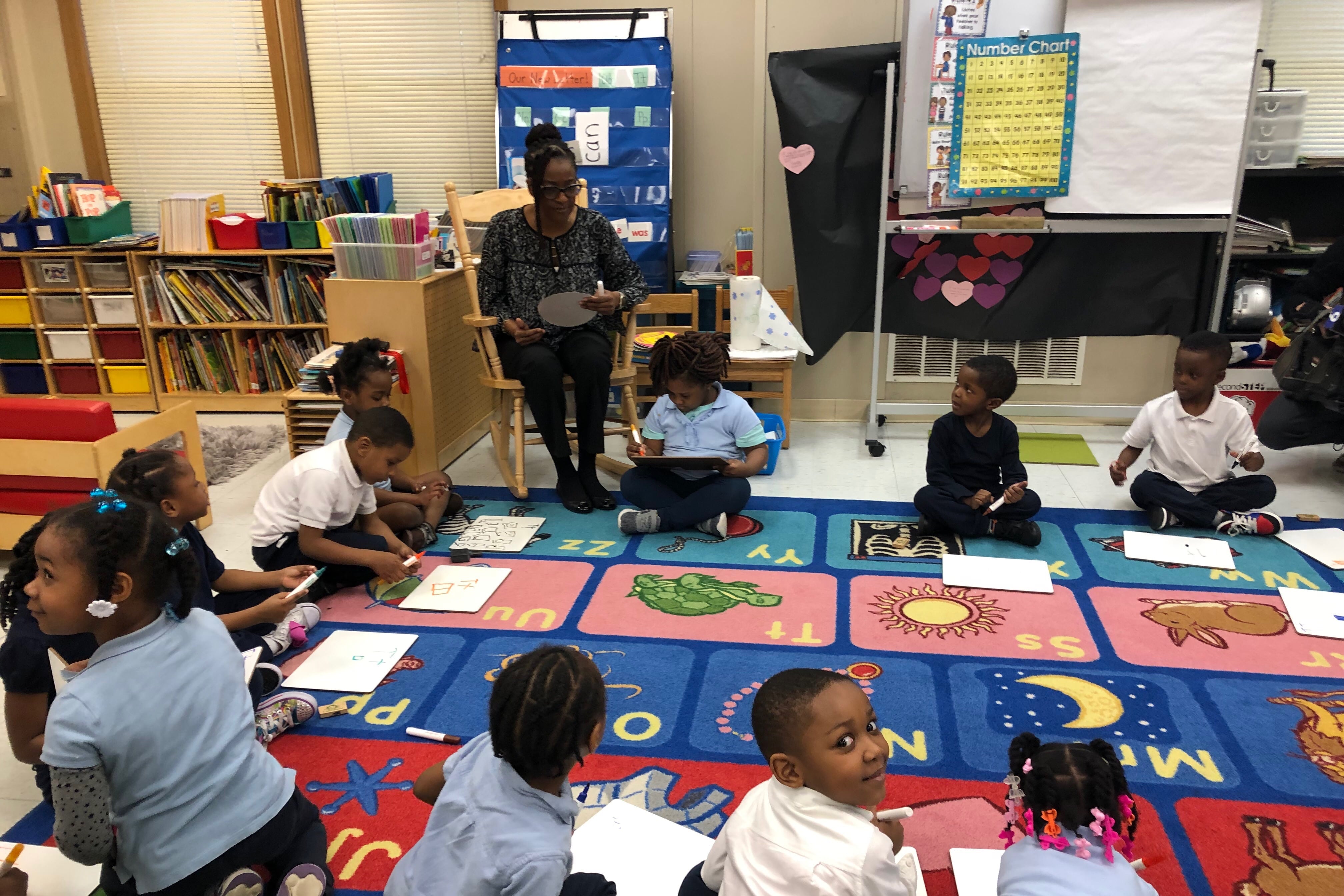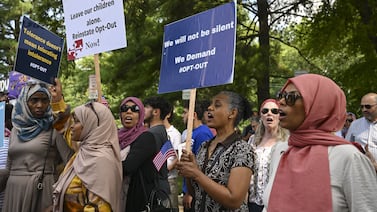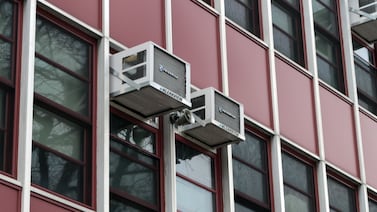Sign up for Chalkbeat Chicago’s free daily newsletter to keep up with the latest news on Chicago Public Schools.
Over the past 32 years, the Minority Teachers of Illinois Scholarship program has awarded more than 13,000 scholarships to thousands of college students of color as part of an effort to increase diversity in the state’s teaching ranks.
Now, even as advocates say more needs to be done to increase the number of teachers of color in classrooms, the Minority Teachers of Illinois Scholarship program has become the target of a lawsuit claiming it discriminates against white students by limiting awards to Black, Latino, Asian American, and Native American students.
Despite the lawsuit claims, numbers show that the majority of the teacher workforce in the state remains white and initiatives such as the scholarship program have made only a small dent in diversifying the ranks. In 2024, 80% of Illinois teachers were white, compared to 85% in 2010. Currently, about 6.4% of the teacher workforce is Black, 8.9% is Latino, and 2.2% is Asian American, according to the Illinois State Board of Education’s 2024 report card data.
The state’s K-12 population, by contrast, is 45% white, 16.5% Black, 28.1% Latino, and 5.6% Asian American, according to the state board.
This lawsuit comes as conservatives and right-wing groups are challenging diversity efforts in education across the nation. They have been emboldened in part by a 2023 Supreme Court decision that rejected race-based admissions policies at Harvard University and the University of North Carolina.
Erin Wilcox, an attorney with the Pacific Legal Foundation, which filed the lawsuit against the Minority Teachers of Illinois Scholarship on behalf of the American Alliance for Equal Rights, said the Supreme Court reasoned that “just general societal discrimination is not enough anymore. That’s the standard that we’re holding Illinois to.”
In response to the Supreme Court decision and in anticipation of a push by the incoming Trump administration to slash diversity initiatives, some state and college officials are preemptively removing race-based criteria in scholarship programs requirements and opening them up to all students.
In Illinois, a spokesperson for the Illinois Student Assistance Commission, which administers the Minority Teachers of Illinois Scholarship, said it will continue to provide scholarships to students.
Spokespeople for the commission and Gov. J.B. Pritzker said they cannot comment on the ongoing lawsuit.
Pritzker and the Illinois Student Assistance Commission have until Friday, Dec. 20 to respond to the lawsuit.
House Rep. Laura Faver Dias, a former educator who represents several towns North of Chicago, is the lead sponsor on a House resolution supporting the scholarship.. She has worked on bills in the past to address barriers that prevent people of color from entering the teacher workforce.
Faver Dias hopes the resolution will be passed in Springfield during the lame-duck session in January.
“I essentially filed the resolution to show, when we pass it, that the General Assembly stands behind this program and stands behind breaking down systemic barriers to people getting their teacher degree,” Faver Dias told Chalkbeat.
State scholarship program aims to diversify teacher workforce
The Minority Teachers of Illinois scholarship program was created in 1992 to encourage students of color to pursue careers in teaching and aims to “provide minority children with access to a greater number of positive minority role models.”
Research has shown that having a teacher of color improves academic performance for all students. A working paper by the Annenberg Institute at Brown University found that students of color who had a teacher of color in fourth or fifth grade saw significant gains in reading and math test scores and were least likely to be chronically absent when in high school. White students also saw growth in reading and math test scores when paired with a teacher of color instead of a white teacher, with those effects lasting until high school.
The Minority Teachers of Illinois scholarship seeks to put more teachers of color in the classroom by requiring recipients to work full-time at an Illinois nonprofit Illinois public, private, or parochial preschool, elementary, or secondary school with at least 30% students of color after graduation. Recipients are expected to teach one year for each academic year they received the scholarship. If students don’t fulfill the requirements, the scholarship will revert back to a loan that students have to pay off.
From 1992 to 2024, the Minority Teachers of Illinois scholarship program gave out 13,752 awards totaling about $67.4 million, according to the Illinois Student Assistance Commission data provided to Chalkbeat. This number could include students who received the scholarship more than once throughout their time in college. A spokesperson from the commission said available data shows that at least 50% of scholarship recipients went on to teach at schools with 30% minority students.
The program has grown in recent years: Under Pritzker’s administration, the state has appropriated $1.9 million in between fiscal years 2020 and 2022, $4.2 million in fiscal year 2023, and $8 million in fiscal years 2024 and 2025 to the program. The number of scholarships awarded jumped from 363 in 2019 to 566 in 2023.
Still, because the Illinois Student Assistance Commission does not track how many scholarship recipients have stayed in the teaching profession after fulfilling their scholarship requirements, it’s unclear what the long-term impact the scholarship has had on the state’s teacher workforce.
Faver Dias said the state needs to do a better job at enforcing the scholarship terms and tracking what students do need to ensure “that our taxpayer dollars are invested here for the long term.”
The state’s General Assembly or the commission could make changes to ensure that the outcomes of the program for students are tracked in the future, according to Faver Dias.
Who becomes and stays a teacher in Illinois?
In Illinois, the teacher population has grown since 2010 and the number of Latino and Asian American teachers has increased, but the number of teachers of color overall remains relatively small.
This issue isn’t exclusive to Illinois. Nationwide, in 2020-21, white teachers made up 80% of educators, while 6% were Black, 9% were Latino, 2% were Asian American, and less than 1% were Native American, according to data from the National Center for Educational Statistics.
Advocates who want to diversify the Illinois teacher workforce see the Minority Teachers of Illinois Scholarship as one way to get educators of color into classrooms.
Robin Steans, president of Advance Illinois, a statewide education policy advocacy organization, said the Minority Teachers of Illinois Scholarship is about more than just the race and ethnicity of teachers entering the classroom.
“The target of the program is less the candidates themselves than it is about the students they are ultimately going to teach,” Steans said.
Steans said the requirement that scholarship recipients must teach in a school with 30% or more students of color is critical.
Over the past several years, the state has rolled out a number of teacher diversity initiatives. In 2021, the state board announced a program to work with colleges and universities around the state to help get more teachers of color into the workforce.
Some state advocates have said programs through nonprofit organizations like Teach For America, Golden Apple, and local Grow Your Own Programs – these programs receive funding from that state — have also been useful to help diversify Illinois teachers, but these programs are not exclusive to students of color.
Other state-funded awarded financial aid includes the Golden Apple Scholarship of Illinois, which has provided over 700 awards to students that amount to $2.9 million in 2023. The state also provides the Monetary Award Program grants for all students who can demonstrate financial need; in 2023, the state awarded 150,000 grants.
A recent report by the National Council of Teacher Quality found that colleges and universities have to do more to produce teachers of color. For instance, institutions of higher education would need to provide support to college students and find apprenticeship programs and grow their own programs to help college graduates get into the classroom.
Still, getting teachers of color into classrooms is not enough. Keeping them in education is also key. In Illinois, teachers of color in Illinois also leave the profession at higher rates. In 2024, the three-year average teacher retention rate overall in the state was 89.6%, while the rate for Black educators was 84.6%, according to the state board’s 2024 report card.
Conservatives step up fight against diversity efforts
Teacher diversity programs in Illinois and the country could now be in danger as conservative groups challenge initiatives through policy change and lawsuits such as the one against the Minority Teachers of Illinois Scholarship.
It’s not a surprise to Monique Redeaux-Smith, director of union professional issues at the Illinois Federation of Teachers.
“At every turn in our nation’s history, whenever there’s any kind of semblance of racial progress, there is a white backlash,” said Redeaux-Smith. “We’re living through one right now.”
Among those leading the charge against affirmative action and race-based diversity initiatives is Edward Blum. The conservative activist founded Students for Fair Admission, whose challenge of race-based admissions policies at Harvard led to the 2023 Supreme Court decision, and the American Alliance for Equal Rights, the group challenging the Minority Teachers of Illinois Scholarship. Blum told the New York Times in 2023 that his work won’t stop at colleges and universities’ admission policies but he plans to turn his attention to employer diversity initiatives and college internships, scholarships, and research grants.
In the case against the Minority Teacher of Illinois Scholarship and in the cases against Harvard and the University of North Carolina, the conservative groups have argued that affirmative action or race-based scholarship programs violate the Equal Protection Clause of the 14th amendment, which requires states to provide equal protections to all citizens
“Legally speaking,” said Paul Gowder, a professor of Law at Northwestern University’s Pritzker School of Law, “from the standpoint of the Supreme Court doing constitutional law, there’s no difference between minority scholarship program and school segregation.”
The Supreme Court’s decision in the Harvard admissions case has opened the floodgates for more cases to be filed that will challenge race-conscious policies in higher education and K-12 schools, Gowder said.
Erin Wilcox, the attorney with the Pacific Legal Foundation, said the case against the Minority Teachers of Illinois scholarship is challenging the state on differential treatment based on race and ethnicity. She said the only way for the state to prove that the scholarship program is needed is if there was a previous “instance of a statutory or constitutional violation, so, somewhere in the past, the state has violated a law or the Constitution, and the only way to remedy that is to treat people differently based on their skin color.”
Illinois could have two ways to preserve the Minority Teachers of Illinois Scholarship, Gowder said. First, state officials could prove that the scholarship program is for a “compelling state interest” by using research showing that a diverse teacher workforce will increase academic performance of all students. They could also change the eligibility requirements for the program to include socioeconomic status, multilingual skills, or other metrics to engage disadvantaged students.
Redeaux-Smith said the Illinois Federation of Teachers and its allies around the state will be looking at potential protections for diversity initiatives, working to get rid of barriers that prevent students of color from entering the teaching profession, and figuring out funding for diversity programs.
“We have to get together and really think about and figure out what our strategy is. Again, it is not just to maintain what we have, but to move forward and advance what we need to be doing,” said Redeaux-Smith. “These initiatives, while good, are not nearly enough for what we actually need.”
Samantha Smylie is the state education reporter for Chalkbeat Chicago covering school districts across the state, legislation, special education and the state board of education. Contact Samantha at ssmylie@chalkbeat.org.





